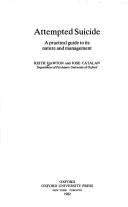| Listing 1 - 4 of 4 |
Sort by
|
Book
ISBN: 9781433830808 1433830809 Year: 2020 Publisher: Washington, DC: American psychological association,
Abstract | Keywords | Export | Availability | Bookmark
 Loading...
Loading...Choose an application
- Reference Manager
- EndNote
- RefWorks (Direct export to RefWorks)
This book is intended for professional psychologists and other psychotherapists who deal with adult outpatients with suicidal behavior. It helps psychotherapists become better at assessing, managing, and treating patients who are suicidal. Those who belong to a community in which they feel loved and valued are much less likely to die from suicide. Unfortunately, many people lack that sense of connection. Often, they end up in the offices of psychotherapists who must help them build or reestablish the social connections and resources needed to make life worth living. Suicide is caused by many factors embedded in the personal histories and experiences of every patient. The book describes the public health importance of suicide; attitudes toward suicide in society and among psychotherapists; and essential competencies needed to assess, manage, and treat suicidal patients. It reviews the steps in screening and assessing suicidal risk, including learning about the patient's suicide ideation, suicide plans, and past suicide attempts. It also describes additional information that psychotherapists need in assessing their patients. The book presents recommendations for the first stages of treatment, which emphasize informed consent, establishment of a good treatment relationship, and suicide management. It describes how psychotherapists can adapt their interventions to address issues that arise in the treatment of suicidal patients and also describes how to reduce the risk of professional liability. The book covers ethically based quality enhancement (risk management) strategies and documentation. Finally, it highlights the importance of emotional competence as an essential quality for doing good clinical work
Suicide --- Suicidal behavior --- Comportement suicidaire --- Psychological aspects. --- Prevention --- Aspect psychologique. --- Prévention --- Psychological aspects --- Suicide - Psychological aspects --- Suicide - Prevention --- Prevention. --- Prévention
Book
ISBN: 1619422794 9781619422797 9781619422674 1619422670 9781621003236 162100323X 9781621003786 1621003787 Year: 2012 Publisher: Hauppauge, N.Y. Nova Science Publisher's
Abstract | Keywords | Export | Availability | Bookmark
 Loading...
Loading...Choose an application
- Reference Manager
- EndNote
- RefWorks (Direct export to RefWorks)
Suicide --- Prevention of suicide --- Suicide prevention --- Prevention. --- Suicide -- Prevention. --- Suicide -- Psychological aspects. --- Psychiatry --- Health & Biological Sciences --- Psychiatric Disorders, Individual --- Prevention --- Psychological aspects.

ISBN: 0192612891 9780192612892 Year: 1982 Publisher: Oxford ; New York : Oxford University Press,
Abstract | Keywords | Export | Availability | Bookmark
 Loading...
Loading...Choose an application
- Reference Manager
- EndNote
- RefWorks (Direct export to RefWorks)
Suicide --- Crisis intervention (Mental health services) --- Brief psychotherapy --- Prevention --- Psychological aspects --- Brief psychotherapy. --- Prevention. --- Psychological aspects. --- Crisis intervention (Mental health services). --- Suicide - Prevention --- Suicide - Psychological aspects --- Suicide - Great Britain
Book
ISBN: 9782130576488 2130576486 Year: 2009 Publisher: Paris : Presses universitaires de France,
Abstract | Keywords | Export | Availability | Bookmark
 Loading...
Loading...Choose an application
- Reference Manager
- EndNote
- RefWorks (Direct export to RefWorks)
Pourquoi le travail conduit-il certains d'entre nous à se suicider ? Que signifient ces actes, quel message adressent-ils à ceux qui restent ? Que s'est-il passé dans le monde du travail pour que des suicides soient perpétrés jusque sur les lieux du travail ? En quoi consistaient les protections qui permettaient naguère de conjurer ce fléau ? Que faire après un suicide ? Quelles investigations convient-il de mettre en oeuvre pour élucider les étapes du processus conduisant à la mort ? Quelles transformations de l'organisation du travail peut-on envisager pour reconstruire le tissu social et les solidarités sans lesquelles il n'y a pas de prévention du suicide possible ? Ce livre rassemble les principales données cliniques et théoriques sur le suicide au travail. Prenant appui sur une intervention menée après plusieurs suicides sur un même site, les auteurs proposent une série de principes sur lesquels il est possible de fonder une action rationnelle.
Suicide --- Psychological aspects --- Prevention --- Stress du au travail --- Employees --- Working class --- Job stress --- Work environment --- Industrial sociology --- Personnel --- Travailleurs --- Conditions de travail --- Sociologie industrielle --- Suicidal behavior --- Comportement suicidaire --- Stress dû au travail --- Suicide - Psychological aspects --- Suicide - Prevention
| Listing 1 - 4 of 4 |
Sort by
|

 Search
Search Feedback
Feedback About UniCat
About UniCat  Help
Help News
News